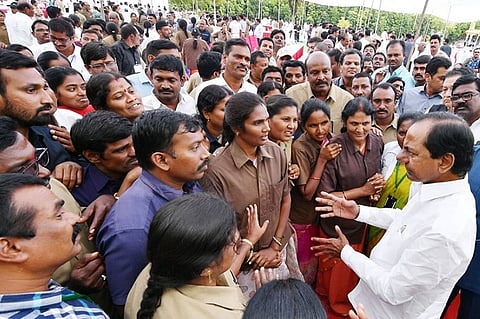

In what seems to be a complete U-turn, Telangana Chief Minister K Chandrasekhar Rao on Sunday not only showered sops on the employees of the Telangana State Road Transport Corporation (TSRTC), who were on strike for nearly two months, but also assured them that not a single private bus will be allowed on TSRTC routes.
Three days after over 48,000 employees resumed their duties after a 56-day-long strike, the Chief Minister assured them full job security saying that not a single employee will be sacked. During an interaction with selected employees in Hyderabad, KCR announced that salaries for September will be paid on Monday while salaries for the strike period will also be paid subsequently.
Going a step forward, the Chief Minister announced that the retirement age of the employees would be increased from 58 to 60 years. He also promised to absorb the contract workers into the Corporation.
He also agreed to the demand made by striking workers and said that women employees will not be given night duties and should get off work by 8 pm.
"In every depot, within 20 days, exclusive toilets, dress change rooms and lunchrooms for women should be created. All TSRTC women employees, like their counterparts in the government, will get three months child care leave along with maternity leave," a press release from the Chief Minister's Office (CMO) said.
KCR also said that women employees need not wear the 'khaki' uniform and can pick a uniform in the colour of their choice. A similar decision could also be considered for the male employees if they wanted a change, the CM said.
At Sunday's meeting, KCR announced that the government will allocate Rs 1,000 crore every year for the TSRTC from the next budget.
He also shared his vision of TSRTC, saying he wished to see the transport utility turning profitable as early as possible.
He also announced that in case of employees who died during the strike period, one job will be given to members of their family within eight days. The government will also pay Rs 2 lakh each as an ex-gratia.
Five employees from each of the 97 RTC depots spread across the state attended the interaction held at Pragati Bhavan, the official residence of the Chief Minister. KCR also hosted a lunch for the invitees and enquired about their problems.
The interaction was seen by many as an attempt to isolate the leaders of employees' unions as KCR had blamed them for misleading the employees and pushing them into a state of uncertainty and the state-owned organization further deep into losses.
During the meeting, KCR announced that for a two-year period, there would not be any elections for the TSRTC recognised union. Instead, with two employees for each depot, an Employees Welfare Board will be constituted, to receive complaints, which will be directly monitored by senior officials.
About 48,000 employees had been on strike since October 5 to press for 26 demands, the chief being TSRTC's merger with the government.
The Chief Minister’s slew of announcements comes a month after he had declared that over 48,000 employees were 'self-dismissed' by going on an 'illegal' strike and could not resume duties before the expiry of the deadline set by the government. He had also constantly berated them for going on strike and threatened to privatise bus routes of the TSRTC, creating a fear of unemployment among striking workers.
The fear of losing their jobs drove at least five employees to kill themselves during the strike while some others died of cardiac arrest with union leaders linking this to depression caused by the government's threats and non-payment of salaries.
The government adopted a tough stand, drawing criticism from the entire opposition, which backed the strike and series of protest programmes were undertaken by the striking employees including a state-wide shutdown.
Unfazed by the protests, KCR had even announced privatisation of 5,100 RTC routes. The government had received a shot in the arm with the Telangana High Court upholding the decision of the state cabinet to give permits to private operators on half of the RTC routes.
The government's position was further bolstered by the High Court's direction to the Labour Commissioner to take a decision on the legality of the strike. He was authorised to decide on whether to approach the Labour Court or not.
The Joint Action Committee (JAC), spearheading the strike, tried to outsmart the government by calling off the strike on November 25 but the TSRTC refused to take them back, citing the proceedings before the Labour Commissioner. The employees, who tried to rejoin the duties the next day, were turned back and even arrested.
It was finally on November 28 that KCR decided to take back the employees. He also announced hike in bus fares to mobilise an additional income of Rs 750 crore annually to partially wipe out the losses.
IANS inputs